Cats are fascinating creatures that have many quirky behaviors. One of these behaviors is lip smacking, which is when cats move their mouths and make a smacking sound with their lips.
You might have noticed your cat doing this after eating, grooming, or when they are feeling stressed or unwell. But why do cats smack their lips and what does it mean?
In this blog article, we will explore some of the possible reasons behind this behavior and how to help your cat if they are lip smacking excessively.
What is Lip Smacking in Cats and Why Do They Do It?
Lip smacking is a behavior in cats that involves moving the mouth and tongue, making a smacking sound when the lips come together. The tip of the tongue may occasionally stick out slightly, which is known as “blepping.”
Lip smacking is a normal activity in particular contexts, such as after eating, drinking, or grooming. It can also indicate contentment or satisfaction, especially if your cat is also purring or kneading.
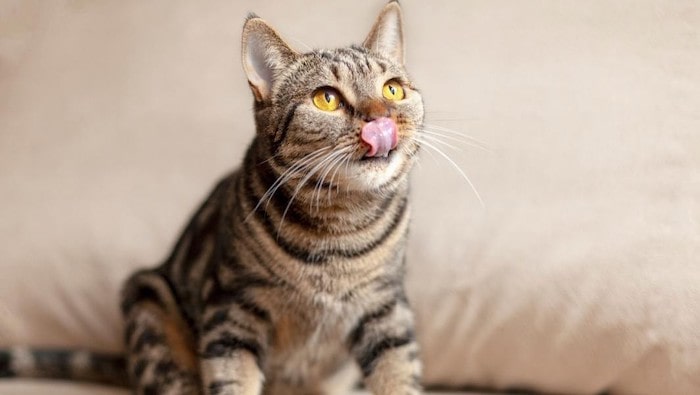
However, lip smacking can also indicate that your cat is feeling uncomfortable, irritated, fearful, or nauseous.
It can also be a symptom of various health issues and injuries that affect the mouth or digestive system.
Therefore, it is important to observe your cat’s body language and other signs to determine the cause and severity of their lip smacking.
Common Causes of Lip Smacking in Cats
Cleaning themselves after eating or drinking
One of the most benign reasons why cats smack their lips is to clean themselves after eating or drinking. Cats are fastidious groomers, and they like to keep their mouths and faces clean.
They may lick their lips, teeth, and whiskers to remove any food or water residue. This is a normal and healthy behavior that helps prevent dental problems and infections.
Feeling thirsty or dry in the mouth
Another simple reason why cats may smack their lips is that they are feeling thirsty or dry in the mouth.
Cats need to stay hydrated for their overall health and well-being, but they may not drink enough water if they are fed a dry diet, live in a hot or dry environment, or have limited access to fresh water sources.
If your cat is smacking their lips frequently, it could be a sign that they need more water.
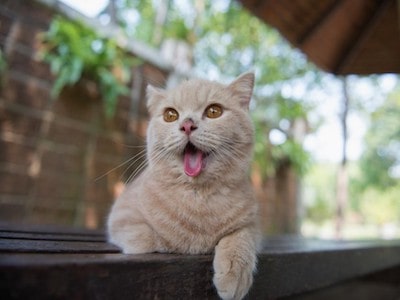
You can encourage them to drink more by providing them with multiple water bowls around the house, using a fountain or dripping faucet, adding water or broth to their food, or feeding them a wet diet.
Feeling anxious or fearful
Lip smacking in cats can sometimes be a sign of stress, anxiety, or fear. Cats may smack their lips when they are faced with a threatening or unfamiliar situation, such as a visit to the vet, a new pet or person in the house, loud noises, or changes in their routine.
Lip smacking is a way for cats to cope with their emotions and calm themselves down. It can also be a warning sign that they don’t want to be approached or touched.
If your cat is smacking their lips due to stress or fear, you should try to identify and eliminate the source of their distress if possible. You can also provide them with a safe and comfortable place to hide, such as a cardboard box, a cat bed, or a closet.
You can also use calming products such as pheromones, herbs, or supplements to help them relax. Most importantly, you should respect your cat’s boundaries and let them come to you when they are ready.
Having an obsessive-compulsive disorder
Some cats may smack their lips excessively due to an obsessive-compulsive disorder (OCD).
OCD is a behavioral condition that causes cats to repeat certain actions over and over again without any apparent reason or benefit.
OCD can be triggered by stress, boredom, frustration, genetics, or neurological problems.
Lip smacking can be one of the compulsive behaviors that cats with OCD display. Other common compulsive behaviors include over-grooming, pacing, chewing, vocalizing, tail chasing, and pica (eating non-food items).
These behaviors can interfere with your cat’s normal functioning and cause physical or psychological harm.
If you suspect that your cat has OCD, you should consult your veterinarian for diagnosis and treatment. Treatment may include medication, behavioral therapy, environmental enrichment, and stress management.
Feeling nauseous or sick
One of the most common reasons why cats smack their lips is that they are feeling nauseous or sick. Nausea can cause cats to salivate more than usual, which can lead to lip smacking.
Nausea can also make cats lose their appetite, vomit, drool, swallow more often, paw at their mouth, or act lethargic.
There are many possible causes of nausea in cats, such as kidney disease, liver disease, diabetes mellitus, pancreatitis, inflammatory bowel disease, food allergies or intolerances, toxin ingestion, parasites, infections, or foreign bodies. Some medications or treatments can also cause nausea as a side effect, such as chemotherapy, antibiotics, or steroids.
If your cat is smacking their lips due to nausea, you should take them to the vet as soon as possible to find out the underlying cause and get the appropriate treatment.
Depending on the cause and severity of the nausea, your vet may prescribe anti-nausea medication, fluids, dietary changes, or other interventions.
Having dental or mouth problems
Another common reason why cats smack their lips is that they have dental or mouth problems.
Dental problems such as tartar buildup, gingivitis, periodontitis, tooth decay, tooth fracture, or tooth resorption can cause pain, inflammation, infection, and bad breath in cats.
Mouth problems such as ulcers, stomatitis, oral cancer, or trauma can also cause similar symptoms.
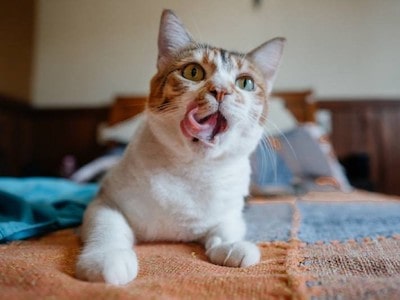
Cats with dental or mouth problems may smack their lips to try to relieve the discomfort or remove the foreign object from their mouth. They may also drool, bleed, have difficulty eating or drinking, lose weight, or show signs of aggression or depression.
If your cat is smacking their lips due to dental or mouth problems, you should take them to the vet for a thorough oral examination and treatment. Treatment may include dental cleaning, tooth extraction, antibiotics, painkillers, anti-inflammatories, or surgery.
Tasting something funny or unique
Sometimes, cats may smack their lips simply because they tasted something funny or unique. Cats have a keen sense of taste and smell, and they can detect subtle differences in flavors and textures.
They may lick their lips to savor the taste, to get rid of the taste, or to express their curiosity or interest.
For example, cats may smack their lips after eating something spicy, sour, bitter, sweet, salty, or minty. They may also smack their lips after licking something that has a strong odor or texture, such as a lemon, a soap bar, a wool sweater, or a plastic bag.
If your cat is smacking their lips after tasting something new or unusual, you don’t need to worry too much unless they show signs of distress or illness.
However, you should make sure that they don’t ingest anything that could be harmful to them, such as toxic plants, chemicals, human foods, or foreign objects.
Having cuts or wounds
Another reason why cats may smack their lips is that they have cuts or wounds in their mouth.
Cats can get injured in their mouth from various sources, such as fighting with other animals, chewing on sharp objects, scratching themselves, or having an allergic reaction.
Cuts or wounds can cause bleeding, pain, swelling, infection, and scarring in cats. Cats with cuts or wounds in their mouth may smack their lips to try to heal themselves by licking the wound.
They may also drool, bleed, have difficulty eating or drinking, lose weight, or show signs of aggression or depression.
Having hairballs
Another reason why cats may smack their lips is that they have hairballs. Hairballs are clumps of fur that accumulate in the cat’s stomach or intestines after they groom themselves. Hairballs can cause discomfort, nausea, vomiting, constipation, or obstruction in cats.
Cats with hairballs may smack their lips to try to expel the hairball from their mouth or throat. They may also cough, gag, retch, or vomit.
If your cat is smacking their lips due to hairballs, you should help them get rid of the hairball by giving them a hairball remedy, such as a lubricant, a fiber supplement, or a special diet.
You can also prevent or reduce hairballs by brushing your cat regularly, keeping them hydrated, and providing them with grass or catnip to chew on.
How to Prevent and Treat Common Causes of Lip Smacking in Cats
The best way to prevent and treat common causes of lip smacking in cats is to provide them with regular veterinary care and a healthy lifestyle. Here are some tips to help you keep your cat’s mouth and digestive system healthy and happy:
- Schedule regular dental check-ups and cleanings for your cat. Your veterinarian can examine your cat’s teeth and gums for any signs of disease or damage and perform any necessary procedures such as scaling or extraction.
You can also brush your cat’s teeth at home with a special toothbrush and toothpaste designed for cats.
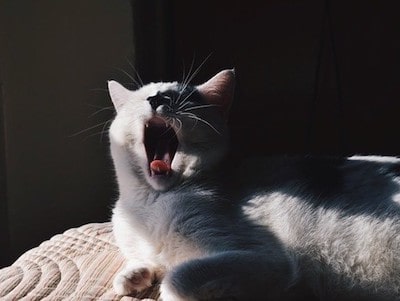
- Feed your cat a high-quality diet that meets their nutritional needs and preferences. Avoid giving your cat human food or treats that are high in fat, sugar, salt, or spices.
You can also consult your veterinarian about the best type of food for your cat based on their age, breed, activity level, and health condition.
- Provide your cat with fresh water at all times. Water helps keep your cat hydrated and flushes out toxins from their body.
You can also encourage your cat to drink more water by using a fountain or adding some flavor to their water such as tuna juice.
- Prevent your cat from ingesting harmful substances or objects that could cause oral injury or irritation.
Keep your cat away from plants, chemicals, medications, wires, cords, or anything else that could be toxic or dangerous for them.
You can also provide your cat with safe and appropriate toys and chews to satisfy their natural curiosity and chewing instincts.
- Reduce your cat’s stress and anxiety levels. Stress and anxiety can affect your cat’s appetite, digestion, and immune system, making them more prone to lip smacking and other health problems.
You can help your cat cope with stress by providing them with a comfortable and secure environment, a consistent routine, plenty of enrichment and stimulation, and positive social interactions.
How to Understand Your Cat’s Body Language and Signals When They Lip Smack
As we have seen, lip smacking in cats can have different meanings depending on the context and the individual cat. Therefore, it is important to understand your cat’s body language and signals when they lip smack to determine their mood and needs. Here are some clues to help you interpret your cat’s lip smacking behavior:
- If your cat is lip smacking after eating, drinking, or grooming, they are likely expressing satisfaction or enjoyment. They may also be cleaning their mouth or removing any food particles or debris. This is a normal and healthy behavior that does not require any intervention.
- If your cat is lip smacking when they are relaxed, happy, or playful, they are likely showing affection or curiosity. They may also be mimicking your speech or trying to communicate with you.
This is a positive and friendly behavior that you can reciprocate by talking to your cat, petting them, or playing with them.
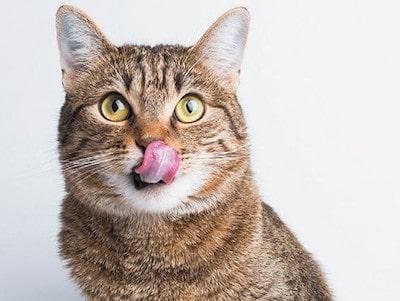
- If your cat is lip smacking when they are annoyed, irritated, or fearful, they are likely warning you to back off or leave them alone. They may also be trying to calm themselves down or cope with a stressful situation. This is a negative and defensive behavior that you should respect by giving your cat some space and time to calm down.
- If your cat is lip smacking when they are unwell, in pain, or nauseous, they are likely showing discomfort or distress. They may also be trying to relieve their symptoms or seek help from you.
This is a concerning and urgent behavior that you should address by checking your cat for any signs of illness or injury and taking them to a veterinarian if needed.
FAQs
Why do cats smack their lips after grooming?
Lip-smacking is a common behavior seen in cats after grooming, and it serves a practical purpose. When cats groom themselves, their rough tongues catch loose fur, debris, and dirt. Smacking their lips helps them remove any leftover material from their mouths, keeping their grooming process efficient and preventing ingestion of unwanted substances.
Is lip-smacking a sign of hunger in cats?
Yes, lip-smacking can sometimes be associated with hunger in cats. When a cat is anticipating food or smells something delicious, they may lick their lips in response to the sensory stimulation. It’s one of the ways they express their excitement or desire for food.
Should I be concerned if my cat excessively smacks their lips?
Excessive lip-smacking or a sudden increase in lip-smacking behavior may be a cause for concern. It could indicate various issues, such as dental problems, mouth sores, gastrointestinal discomfort, or even stress. If you notice any abnormal or concerning behavior in your cat, it’s best to consult a veterinarian for a proper examination and diagnosis.
Can I train my cat to stop lip-smacking if it becomes bothersome?
Since lip-smacking is a natural behavior in cats, attempting to train them to stop may not be effective or advisable. Instead, focus on ensuring your cat’s overall well-being, addressing any underlying health concerns, and providing a stimulating environment to reduce stress-related behaviors. Always remember that understanding and accepting your cat’s unique behaviors is essential in strengthening the bond between you and your feline friend.
Final Thoughts
In conclusion, the intriguing behavior of cats smacking their lips holds several fascinating insights into their world. From grooming habits to expressions of hunger and contentment, lip-smacking is a multi-faceted behavior that serves various purposes.
While it can be a sign of natural feline communication, it’s essential to be aware of any excessive or sudden changes in this behavior, as it could indicate underlying health issues.
As responsible cat owners, observing and understanding our furry companions’ behaviors enriches our bond with them. Remember to prioritize regular veterinary check-ups, dental care, and a stimulating environment to ensure your cat’s overall well-being.
Embrace the uniqueness of your cat’s quirks, including lip-smacking, and cherish the moments of joy and connection they bring into your lives.
Together, we can continue to unravel the captivating mysteries of our feline friends and provide them with the love and care they deserve. Happy cat-parenting!
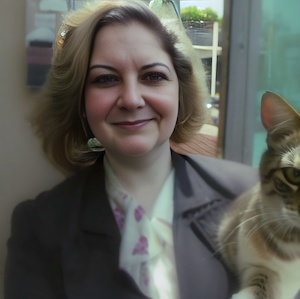
Charlene Pare is the founder of Cat Likes Best. She manages and strategizes the content published on this website. When she isn’t working, she enjoys exploring the city around with her Ameican Shorthair kitty–Moli. Being a technocrat and an avid cat lover, she also writes on pet tech products and some of the featured articles.

